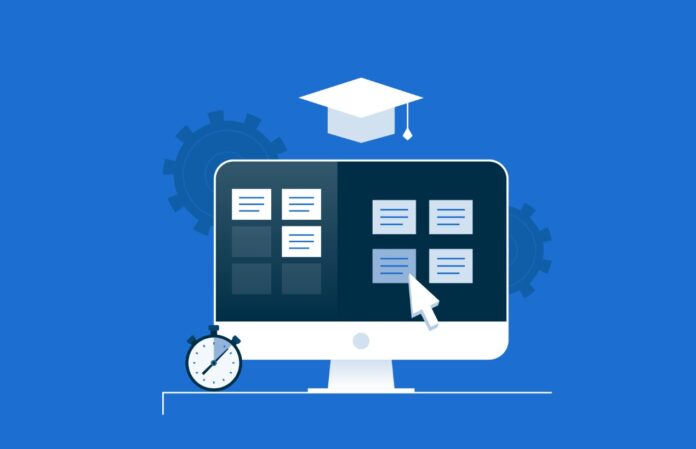In today’s fast-paced world, entities of all sizes continually seek innovative ways to enhance their workforce’s performance and maintain a competitive edge.
A crucial component of getting to this goal is to boost motivation. Engagement is another vital aspect that, together with providing people with ways to obtain all necessary skills to fulfill their roles, makes a company successful.
Today, LMS or the Learning Activity Management System, is a versatile and powerful tool that helps with management and all sorts of improvements and acts as a catalyst for employee motivation and growth.
Today, we share information about the mechanics of an LMS training system and its benefits and delve into specific strategies for leveraging LMS, including AcademyOcean, to increase employee motivation.
What is a Learning Management System?
An LMS management software, often called an LMS, is an all-in-one platform specially developed to fulfill learning tasks and objectives.
Such platforms are also built with convenient management in mind and allow delivering the necessary content conveniently and most engagingly.
Its primary function is to be the central hub for people to access a wide range of learning resources, including courses, modules, videos, assessments, and more.
Such solutions have evolved significantly, offering features such as customization, tracking, reporting, and integration with other software systems.
Benefits of Using an LMS

One of the most persistent issues businesses confront in the ever-changing business world is creating and maintaining high levels of employee motivation. A motivated staff is not only more engaged but also more productive.
Enter the LMS, a dynamic instrument that has emerged as a driving force in igniting and maintaining engagement.
The LMS is a catalyst for workers to gain new skills and discover fresh interests in their professions by providing accessible and engaging learning opportunities.
In this section, we’ll look at how an LMS may improve motivation and growth. We’ll look at how a well-designed LMS may improve onboarding procedures, increase skill visibility, and give essential insights into employee growth.
Furthermore, we will investigate how an LMS’s expanded reporting capabilities are critical in aligning training activities with business goals.
Improved Employee Motivation
Enhancing motivation is a perpetual challenge for organizations. A well-implemented LMS can play the main role in boosting motivation by providing the team with accessible and engaging learning opportunities.
When people have the chance to develop and move forward in their careers, they are way more loyal to the company and motivated to work harder.
The flexibility of an engaged LMS allows people to learn at their own pace, creating an autonomous atmosphere and giving them control over their professional growth.
Quicker Onboarding Process
Efficient onboarding is critical for new people to acclimate swiftly to their roles and become productive team members.
An LMS streamlines the onboarding process by offering structured training modules that cover essential information about the organization, its culture, policies, and job-specific skills.
This reduces the time taken for onboarding and ensures consistent and standardized training across the organization.
Increased Visibility of Skills

Traditional training methods lack transparency in assessing progress and skill development. LMS platforms provide administrators and managers with real-time insights into learning journeys.
This increased visibility allows for targeted support and coaching, enabling employees to address skill gaps and capitalize on strengths. Moreover, employees themselves can track their progress, which can be highly motivating as they witness their growth over time.
Enhanced Reporting Capabilities
In the modern business landscape, it’s impossible to base your decisions on solid data. A modern LMS can offer a convenient place for creating, obtaining and managing reports and tracking progress.
This comprehension of employee training development allows us to gather precious insights into the whole process and make the necessary adjustments to improve it.
Administrators can analyze metrics such as completion rates, assessment scores, and engagement levels. This data helps organizations identify the most effective training content and understand learner behaviors.
4 Ways to Increase Motivation with LMS Software
Rewards for Completing Courses
Human beings are naturally inclined towards achievement, and receiving recognition for their efforts can significantly boost motivation. Introducing a reward system tied to course completion can incentivize employees to engage with the LMS actively.
Rewards can range from digital badges and certificates to small tangible rewards or even opportunities for career advancement.
Adding gamification elements to the learning experience increases the probability that learners will approach the process more enthusiastically and seriously.
Content Targeted for the Employee’s Role

One of the strengths of an LMS is its ability to deliver personalized content.
Tailoring learning materials to align with an employee’s role and career trajectory not only enhances the relevance of the training but also demonstrates the organization’s investment in professional growth.
When employees perceive that the training directly contributes to their job performance and advancement, their motivation to engage with the LMS increases significantly.
Short Courses
During busy work schedules, carving out time for lengthy training sessions can be challenging.
LMS platforms offer the advantage of delivering bite-sized, micro-learning courses that employees can complete in shorter timeframes. These brief courses easily fit into the workday and promote focused and efficient learning.
The sense of accomplishment derived from completing studies quickly can serve as a continuous motivator for employees.
Interactive Content
Passive learning experiences can lead to disengagement and reduced motivation. LMS platforms allow for interactive content integration, such as quizzes, simulations, and scenario-based exercises.
These elements transform the learning experience into an active and engaging process, keeping learners involved and invested.
Interactive content also enhances the retention and application of knowledge, as learners are encouraged to think critically and apply concepts in simulated real-world scenarios.
Conclusion

A motivated and skilled workforce is the cornerstone of success in the dynamic business world. LMS management solutions have emerged as indispensable tools that also act as catalysts for people’s motivation and growth.
By gathering and utilizing solutions such as AcademyOcean LMS, entities of all sizes can achieve an authentic continuous learning culture where everyone is empowered to get new skills, excel in their roles, and contribute meaningfully to the organization’s objectives.
Through personalized content, interactive experiences, rewards, and efficient onboarding, LMS software becomes a strategic enabler in fostering a motivated and engaged workforce poised for individual and collective accomplishments.







